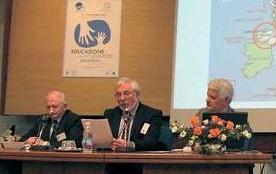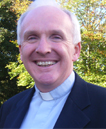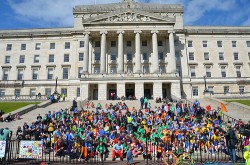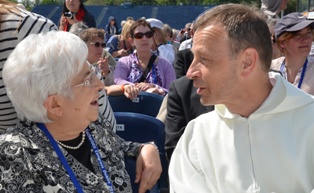 Kevin McKeague and David McConkey are educators who have been working together on several projects for years. The interesting thing is that Professor McKeague is the headmaster of a Catholic school, and Professor McConkey is the headmaster of a Protestant school. And this is not quite the same if you live in Belfast, in Northern Ireland. For years, these two communities were separated, in distinct areas of the city, and during the years of unrest everyone was living in terror. “I heard Chiara Lubich say that the least developed principle of the French Revolution was that of fraternity.
Kevin McKeague and David McConkey are educators who have been working together on several projects for years. The interesting thing is that Professor McKeague is the headmaster of a Catholic school, and Professor McConkey is the headmaster of a Protestant school. And this is not quite the same if you live in Belfast, in Northern Ireland. For years, these two communities were separated, in distinct areas of the city, and during the years of unrest everyone was living in terror. “I heard Chiara Lubich say that the least developed principle of the French Revolution was that of fraternity.
When I met David, I saw it as an opportunity to give an injection of love to our community,” says Kevin McKeague. And he proved it with facts. In 2009 when there was a period of peace, thanks to the political accords, the Protestant school was suddenly attacked. No one was injured, but there was much damage. Students from the Catholic school were the first to respond. With help from the young people from the Focolare Movement they put together a concert entitled, “All for all”. Next they held a peaceful demonstration at Stormont, Northern Ireland’s Parliament Building, along with a mixed encounter with the Parliament’s Education Commission.
“Following this witness of unity,” David McConkey recounts, “the Minister of Education who for economic reasons had decided not to finance the reconstruction of the school, finally decided to rebuild it immediately: the only school in Northern Ireland to receive funds that year.”

The listening audience was the group of people that had joined the workshop on ecumenism on the day dedicated to this topic at the International Eucharistic Congress in Dublin (10-17 June 2012). But what kind of ecumenism are we talking about? Fr Brendan Leahy, Systematic Theology scholar at St Patrick’s College of Dublin and member of the Irish Inter-church Meeting, reminded everyone at the opening of the event: “There are many ways to enter in to the “space” of ecumenism,” he affirmed, recalling the Greek etymology of the term “oikumene” which has the same roots as “house”. “Ecumenism is building a ‘house’ together, in the one Church of Christ”. Ecumenical dialogue as life comes first, therefore. Beginning from the treasures that Christians have in common: the Scriptures, the Creed, the writings of the Fathers of the Church, the Gifts of the Spirit, the witness of living the Gospel. An ecumenism based above all on considering the other as “part of me”, as John Paul II had written in 2001, and on allowing Christ himself to live among those that are united in his name (Mt 18:20).
Many examples of ecumenical life were given. Besides the two principals from Northern Ireland who shared their touching witness, the Reverend Bronwen Carling, a woman priest from the Church of England also spoke. She is now living in Tipperary, Ireland where she animates a group of people from different Christian denominations who meet regularly for deep sharing on the Holy Scriptures, what in the Focolare Movement is known as a Word of Life Group: “By trying to live Christ’s Gospel together, we discovered that we weren’t so different. We discovered the importance of listening to each other. This is what has enabled me to take part in such a “Catholic” event today.”
 What began as a sharing among individuals, transformed into a sharing among groups and, several people from other Movements and Communities from different Churches in Belfast, shared their experience at “Together for Europe”. These included such groups as the Community of Corrymeela, Sword of the Spirit, the L’Arche Community and the Focolare Movement. “We had the feeling that this event that united more than 250 Christian movements and communities from Europe, had taken place just for Northern Ireland.” And so it was that already in 2007 a first meeting was held in the Church of Ireland with 120 participants from 7 different Churches. It was a light of hope ignited in Belfast. And from there the path continued, until last 12 May, when 4000 teens gathered precisely in Stormont. They came from schools of the Republic of Ireland and from Northern Ireland to take part in a worldwide relay race, “Run4Unity” as sign of hope and peace.
What began as a sharing among individuals, transformed into a sharing among groups and, several people from other Movements and Communities from different Churches in Belfast, shared their experience at “Together for Europe”. These included such groups as the Community of Corrymeela, Sword of the Spirit, the L’Arche Community and the Focolare Movement. “We had the feeling that this event that united more than 250 Christian movements and communities from Europe, had taken place just for Northern Ireland.” And so it was that already in 2007 a first meeting was held in the Church of Ireland with 120 participants from 7 different Churches. It was a light of hope ignited in Belfast. And from there the path continued, until last 12 May, when 4000 teens gathered precisely in Stormont. They came from schools of the Republic of Ireland and from Northern Ireland to take part in a worldwide relay race, “Run4Unity” as sign of hope and peace.
The four communities worked together in preparing for this event, involving schools, getting to know each other also through weekend activities amid Corrymeela’s splendid scenery, one community whose scope is precisely ecumenism, reconciliation and peace. “Our sharing deepened more and more, and there was a strong sense of communion. To the point that our togetherness seemed to echo the Last Supper, the Lord’s Supper, the Holy Communion,” recounts Reverend David Godfrey, who was accompanied by his wife Heather. Thomas Kerr, from the Arch Community underscored one special moment he had lived that weekend: the gesture of washing one another’s feet. This, together with the final pact to “love one another as Jesus had loved us” sealed the journey that had been taken up by the different Movements.
 Moving on: After this evening at the Eucharistic Congress: “it becomes clearer that ecumenism is not for specialists, but we can live it, through the dialogue of life, wherever we may be.” These are words of Renate Komorek from the Focolare and moderated the workshop, which echo what had been lived earlier in the Arena, where Prior of Taize Brother Alois, and President of the Focolare Maria Voce, has presented on “Communion in one Baptism” “The conclusions and positions advance also among theologians are not enough, if the people are not prepared,” Maria Voce had affirmed, going on to say: “United by this spirituality, we want to be leaven among all the Churches and to contribute to accelerating their path towards the full communion, also visible, also Eucharistic Communion.”
Moving on: After this evening at the Eucharistic Congress: “it becomes clearer that ecumenism is not for specialists, but we can live it, through the dialogue of life, wherever we may be.” These are words of Renate Komorek from the Focolare and moderated the workshop, which echo what had been lived earlier in the Arena, where Prior of Taize Brother Alois, and President of the Focolare Maria Voce, has presented on “Communion in one Baptism” “The conclusions and positions advance also among theologians are not enough, if the people are not prepared,” Maria Voce had affirmed, going on to say: “United by this spirituality, we want to be leaven among all the Churches and to contribute to accelerating their path towards the full communion, also visible, also Eucharistic Communion.”
by Maria Chiara De Lorenzo

